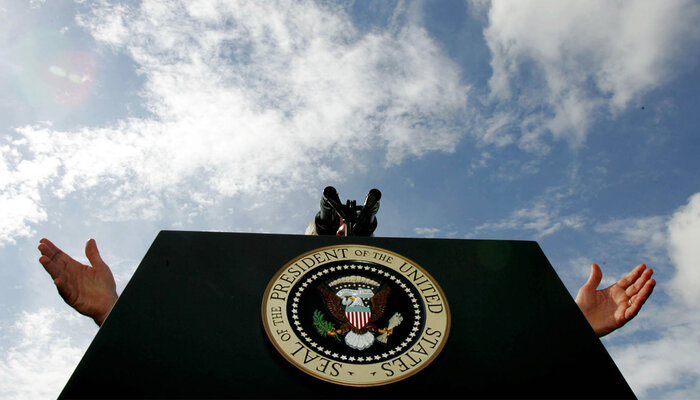Foreword
American democracy urgently needs renewal. In coming years, one of the great issues facing the country will be the presidency itself.
A half century ago, in the wake of Watergate and Vietnam, laws and rules aimed to check the “Imperial Presidency.” Over the decades those limits eroded and then were finally cast off. The past three years have seen a refusal to honor oversight and a politicization of the executive branch. The president insists the Constitution gives him “the right to do whatever I want.” The abuse of power in Lafayette Park this summer was just the most visible, and most violent, example of shattered norms.
In this time of reckoning, a great task must be to reset the system of checks and balances and once again restore the presidency to its rightful place.
This volume includes the first set of recommendations for executive actions from the Brennan Center for Justice at NYU School of Law. These focus on enhancing ethics, transparency, and accountability; curbing political influence in law enforcement; enhancing the role of expertise and science throughout government; empowering congressional oversight; and preventing improper uses of emergency powers.
Congress must do its part to play its constitutional role. Courts, too, must step up.
But the president can lead, displaying what Alexander Hamilton called “energy in the executive,” this time not to grossly expand presidential power, but to restore the office to its rightful role.
We the people have a duty as well: to insist that our leaders commit to the Constitution and make renewal of our democracy not just one issue among many, but a central task for our nation.
Michael Waldman
President
Brennan Center for Justice
October 2020
Introduction
Our democracy is at a critical juncture.
The Covid-19 pandemic has urgently underscored the need for a federal government that can focus on the public interest, is staffed by qualified professionals, and values expertise. Anything less will cost lives and put the nation’s recovery at risk. 1
Even before the pandemic hit, the guardrails that for much of our history ensured an honest, effective federal government had been gravely weakened. There is no question that the norms and practices ensuring ethical governance and the rule of law have degraded substantially. Federal officials have increasingly abused their power by using law enforcement for political purposes, leveraging their positions for financial gain, undermining the role of objective science and research in policymaking, and appointing unqualified candidates to key government posts. Meanwhile, widespread voter suppression, foreign interference, the explosion of money in politics, and the weakening of Congress’s role as a check on the executive branch have undermined many Americans’ faith in our elections and political system — even before the pandemic posed new voting challenges. 2
A bipartisan task force of former senior government officials convened by the Brennan Center for Justice has proposed a comprehensive legislative agenda to restore the checks that previously constrained executive action and prevented abuses of executive power. Even more significant, as their first order of business after retaking the House of Representatives on a strong reform platform, congressional Democrats last year introduced and passed a landmark pair of bills to fix our democracy and give every American a voice: H.R. 1, the For the People Act, and H.R. 4, the Voting Rights Advancement Act.
While legislation is undoubtedly needed, the next president doesn’t have to wait for Capitol Hill to begin fixing the system. This report proposes 22 executive actions — executive orders, memoranda, and other directives 3 — that would restore the integrity of government and strengthen our democracy. All are squarely within the president’s authority.
To rebuild the guardrails that prevent the abuse of executive power, the president should issue orders and directives focusing on five areas: preventing improper political interference in law enforcement, strengthening ethics and conflict-of-interest rules, supporting the integrity of science and research in policymaking, promoting the appointment of qualified executive branch officials, and respecting Congress’s role as a coequal branch of government. In each of these areas, Democratic and Republican administrations alike have recognized constraints, but as recent abuses show, the unwritten norms of conduct that previously ensured integrity in government can too easily be cast aside. Formal written rules are needed.
And to make our elections fairer, the president should issue orders and directives focusing on three additional areas: shoring up campaign finance enforcement and other safeguards, bolstering election security, and expanding access to the voter rolls.
Together, the actions detailed in this report would signal a clear break from the abuses of the recent past and would be a significant step toward restoring faith in American democracy. By highlighting the urgency of these issues, they could also help weaken the gridlock that so often plagues Congress.
There is plenty of precedent for executive actions of this sort. 4 Many of these actions track the approach taken in legislation introduced in Congress in recent years or in the legislative recommendations of the Brennan Center’s bipartisan task force.
The pandemic will eventually be overcome, but these realities will remain: All Americans, regardless of political orientation, want government officials to put the public interest ahead of their own political or personal gain. And all Americans want their voices and their votes to count. The next president has the power to move swiftly toward those goals.
Endnotes
-
1
Instead, the Trump administration initially downplayed the crisis, then aimed to address it by sidelining scientific experts, favoring political allies, and placing politics ahead of Americans’ health. This deeply flawed response is one reason why the U.S. currently has more Covid-19 cases than any other country on earth. See “44 Times Trump Downplayed the Coronavirus,” Washington Post, May 6, 2020, https://www.washingtonpost.com/video/politics/34-times-trump-downplayed-the-coronavirus/2020/03/05/790f5afb-4dda-48bf-abe1-b7d152d5138c_video.html; James Hohmann, “The Daily 202: Ousted Vaccine Expert, Alleging Retaliation, Is Not the First Scientist Sidelined in Trump Era,” Washington Post, Apr. 23, 2020, https://www.washingtonpost.com/news/powerpost/paloma/daily-202/2020/04/23/daily-202-ousted-vaccine-expert-alleging-retaliation-is-not-the-first-scientist-sidelined-in-trump-era/5ea11bf588e0fa34528d7574; Jonathan Allen, Phil McCausland, and Cyrus Farivar, “Behind Closed Doors, Trump’s Coronavirus Task Force Boosts Industry and Sows Confusion,” NBC News, Apr. 11, 2020, https://www.nbcnews.com/politics/white-house/trump-s-coronavirus-task-force-amassed-power-it-boosted-industry-n1180786; and Isaac Stanley-Becker, Toluse Olorunnipa, and Seung Min Kim, “Trump Foments Resistance to Democratic-Imposed Shutdowns, but Some Republican Governors Are Also Wary of Moving Too Fast,” Washington Post, Apr. 17, 2020, https://www.washingtonpost.com/politics/trump-foments-resistance-to-democratic-imposed-shutdowns-but-some-republican-governors-are-also-wary-of-moving-too-fast/2020/04/17/5595e5fa-80c2–11ea-9040–68981f488eed_story.html?itid=ap_toluseolorunnipa. -
2
According to a 2019 poll, less than 30 percent of Americans today said they could trust government in Washington to do what is right “just about always or most of the time.” “Public Trust in Government: 1958–2019,” Pew Research Center, Apr. 11, 2019, https://www.people-press.org/2019/04/11/public-trust-in-government-1958–2019. -
3
Unlike memoranda and directives, executive orders are required to be published in the Code of Federal Regulations. For a discussion of different types of executive actions, see Vivian S. Chu and Todd Garvey, “Executive Orders: Issuance, Modification, and Revocation,” CRS Report No. RS20846 (Washington, DC: Congressional Research Service, 2014), https://fas.org/sgp/crs/misc/RS20846.pdf; Randolph D. Moss, Acting Assistant Attorney General, “Legal Effectiveness of a Presidential Directive, as Compared to an Executive Order” (official memorandum, Washington, DC: Department of Justice, Jan. 29, 2000), https://fas.org/irp/offdocs/predirective.html; and “Executive Order, Proclamation, or Executive Memorandum?” Library of Congress, accessed May 14, 2020, https://guides.loc.gov/executive-orders/order-proclamation-memorandum. -
4
Michael Waldman and Inimai Chettiar, eds., 15 Executive Actions, Brennan Center for Justice, 2014, 12, https://www.brennancenter.org/sites/default/files/2019–08/Report_15_Executive_Actions.pdf.






